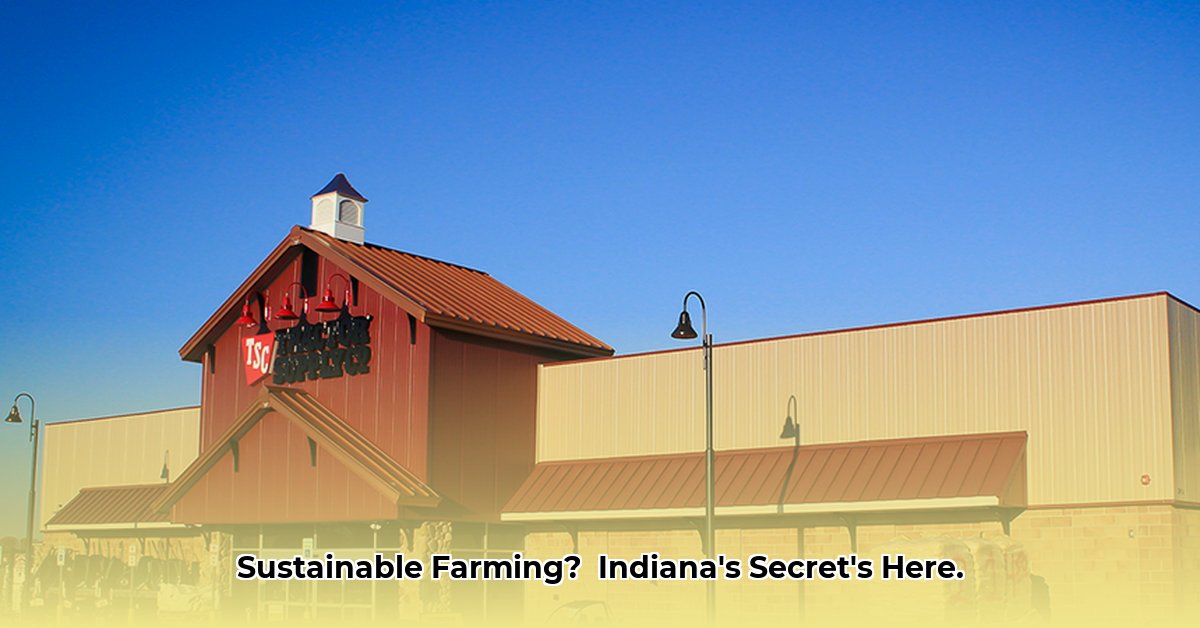
Sustainable agriculture is crucial for Indiana's future. This guide explores how Indiana PA Tractor Supply contributes to—and can further support—sustainable farming practices. We'll examine their product offerings, address knowledge gaps, and provide actionable steps for farmers, gardeners, and the company itself. For more information on garden tillers, check out this resource.
Understanding Tractor Supply's Role in Sustainable Agriculture
Tractor Supply Company (TSC) offers a broad selection of agricultural supplies, ranging from conventional tools and feed to organic seeds and compost. However, the extent of their commitment to sustainable agriculture requires deeper examination. While they offer products supporting sustainable practices, a lack of transparent information regarding supply chains and environmental impact creates a significant knowledge gap. This lack of readily available data limits informed consumer choices.
Key Challenges and Opportunities
The effectiveness of TSC's contribution hinges not only on product availability but also on the broader context of sustainable agriculture. Key challenges include:
- Supply Chain Transparency: Limited information on the environmental impact of product sourcing and transportation. More transparent reporting on life cycle assessments (LCAs) of key products would significantly improve consumer awareness.
- Product Certification: Inconsistencies in product labeling and certification can mislead consumers seeking truly sustainable options. Clearer labeling and readily available sourcing details are needed.
- Education and Outreach: Farmers and gardeners need accessible information on sustainable practices. TSC can play a vital role in providing educational resources and workshops.
Actionable Intelligence: Steps for Sustainable Farming Success
Here’s how various stakeholders can foster sustainable farming, leveraging TSC's resources:
For Tractor Supply Company:
- Enhance Transparency: Publicly release data on the environmental footprint of its products and operations, including life cycle assessments (LCAs) (a detailed analysis of a product’s environmental impact from creation to disposal). This empowers informed consumer choices.
- Strengthen Partnerships: Collaborate with suppliers committed to environmentally friendly production and fair labor practices.
- Invest in Education: Offer in-store workshops, online resources, and demonstrations on water conservation techniques, integrated pest management (IPM), and other best practices. This empowers customers to make sustainable choices.
- Sustainable Packaging Initiatives: Explore and implement eco-friendly packaging alternatives to minimize waste and pollution.
For Farmers and Gardeners:
- Prioritize Certified Products: Choose products with USDA Organic, Biodynamic, or other reputable certifications guaranteeing sustainable production methods.
- Engage in Continuous Learning: Participate in workshops and online courses to improve understanding of sustainable farming practices, including water management and integrated pest management (IPM).
- Implement Waste Reduction Strategies: Minimize waste through reuse and recycling of packaging materials whenever possible.
For Suppliers of TSC:
- Embrace High Environmental Standards: Adopt and maintain rigorous environmental standards throughout the production process, ensuring transparency in operational details.
- Innovation in Sustainable Products: Collaborate with TSC and other stakeholders to develop and implement more sustainable alternatives to existing products.
For Indiana Communities:
- Advocate for Transparency: Communicate directly with TSC expressing a strong preference for transparency in their sustainability initiatives, influencing their future practices.
- Support Local Farms: Prioritize purchasing from local farmers and producers that utilize environmentally sound practices. This helps sustain the local economy and promotes environmentally conscious agriculture.
Common Farming Challenges and Mitigation Strategies
Certain farming practices present significant environmental risks. Here’s a breakdown:
| Agricultural Practice | Potential Environmental Risks | Mitigation Strategies |
|---|---|---|
| Conventional Fertilizers | Water pollution, soil degradation, greenhouse gas emissions | Transition to organic fertilizers, compost, cover cropping. |
| Synthetic Pesticide Use | Harm to beneficial insects, water contamination, human health risks | Integrated Pest Management (IPM), biopesticides, crop rotation |
| Inefficient Irrigation | Water depletion, soil salinity | Drip irrigation, rainwater harvesting, soil moisture sensors |
| Excessive Packaging Waste | Landfill burden, plastic pollution | Sustainable packaging materials, reduced packaging |
| Unsustainable Supply Chains | Deforestation, labor exploitation | Fair trade, certified sustainable sources |
Navigating Regulations and Best Practices
Adherence to state and federal regulations is critical for sustainable agricultural practices. Consult the Pennsylvania Department of Agriculture website for updated regulations regarding pesticide use, water quality, and other relevant concerns.
Building a Sustainable Future Together
TSC plays a vital role in Indiana's agricultural landscape. Shared commitment to transparency, responsible practices, and collaboration among farmers, suppliers, TSC, and consumers is paramount for creating a truly sustainable agricultural future for Indiana.